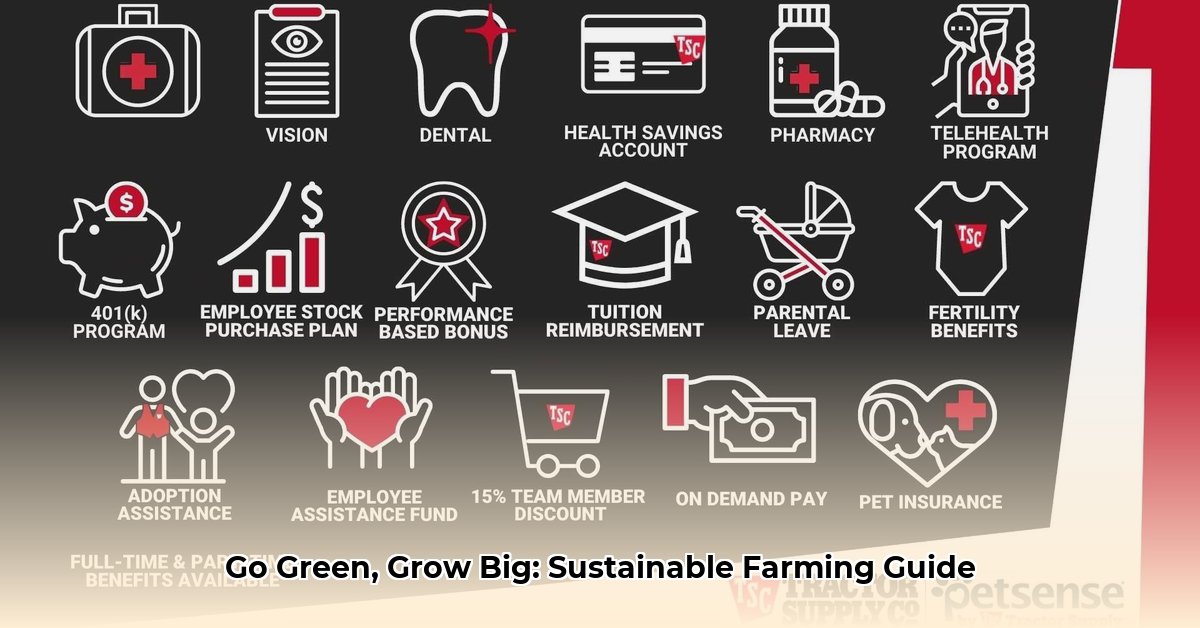
Tractor Supply Company (TSC): A Partner in Sustainable Agriculture
Thinking about farming in a way that's both profitable and environmentally responsible? You're not alone. Many farmers are seeking ways to increase yields while minimizing their environmental impact. This article explores how Tractor Supply Company (TSC), a major agricultural retailer, plays a vital role in supporting sustainable and regenerative farming practices. We'll examine TSC's contributions, highlight actionable steps for farmers and consumers, and identify areas for future improvement. Learn more about TSC's grow bags https://tractor-supply-grow-bags.pages.dev.
TSC's Role in Promoting Sustainable Practices
TSC’s commitment to sustainable agriculture manifests in several key ways. First, their extensive product catalog, available as a PDF, offers a wide range of eco-friendly options. This includes organic seeds promoting biodiversity and reducing pesticide reliance, water-efficient irrigation systems crucial for drought resilience, and even compostable packaging, minimizing waste. But TSC's influence extends far beyond mere product selection.
How can farmers effectively utilize TSC's resources? Isn't access to sustainable products only half the battle? The answer lies in TSC's broader initiatives. They actively partner with organizations like the American Farmland Trust 1, providing significant financial grants to support farmers transitioning to regenerative agriculture. These grants demonstrate a substantial investment in the long-term health of both the environment and the agricultural industry. Such partnerships not only provide funding but also facilitate knowledge sharing and access to crucial resources.
"TSC's commitment goes beyond simply offering sustainable products," says Dr. Emily Carter, Professor of Agricultural Sustainability at the University of California, Davis. "They are actively engaging in collaborative efforts that extend far beyond retail, directly supporting farmers in their transition to more sustainable methods."
Actionable Steps: A Practical Guide
Ready to implement more sustainable practices on your farm? Here's a step-by-step guide using TSC's resources:
Assess Your Current Practices: Begin by identifying areas where your farm's environmental impact is most significant (e.g., water usage, fertilizer application, waste generation). This honest self-assessment is the foundation for effective change.
Explore the TSC Catalog: Thoroughly review the TSC catalog, focusing on products that directly address your identified environmental concerns. Their online search function and detailed product descriptions can be invaluable.
Develop a Phased Implementation Plan: Don't attempt a complete overhaul simultaneously. Start with one or two manageable goals, creating a phased approach that allows for adjustments based on your observations and experiences. This strategic planning minimizes overwhelm and maximizes success.
Monitor Progress and Adapt: Regularly track your progress and make adjustments as needed. This iterative process allows for refinement, ensuring your strategies remain effective and efficient.
Technology's Role in Sustainable Farming
TSC's catalog also showcases cutting-edge agricultural technologies. Precision farming tools, such as smart fertilizer spreaders and high-tech irrigation systems, optimize resource use, reducing waste and environmental impact. Data-driven decision-making, facilitated by these technological advancements, is becoming increasingly crucial for efficient and sustainable farming.
Isn't the adoption of technology crucial for long-term sustainability? Absolutely. By embracing data-driven approaches and implementing precise resource management, farmers can significantly reduce their environmental footprint while enhancing profitability.
The Need for Transparency: A Call for Greater Accountability
While TSC's contributions are significant, greater transparency regarding their own environmental footprint would further enhance their credibility and build stronger trust with consumers. Detailed information on their carbon emissions, waste reduction strategies, and supply chain sustainability would encourage wider adoption of their sustainable products and practices.
This increased transparency could involve providing detailed lifecycle assessments of their products, clearly outlining energy consumption, material sourcing, and waste generation. Such information empowers consumers to make informed purchasing decisions, supporting companies truly committed to sustainability.
A Collaborative Harvest: The Future of Sustainable Agriculture
Sustainable agriculture requires a collective effort. Farmers, retailers like TSC, consumers, and policymakers all play vital roles. TSC's contributions represent a crucial step towards building a more sustainable food system. By embracing collaboration, investing in innovation, and demanding greater transparency, we can collectively cultivate a greener and more resilient future for agriculture. What steps will you take?